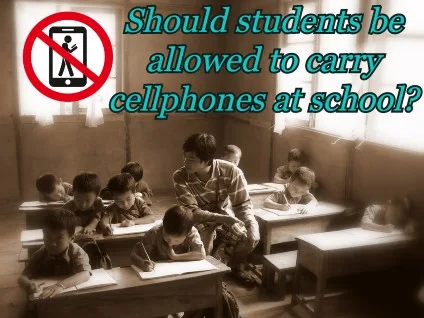Should Students Be Allowed To Carry Cell Phones At School?
Introduction:
In an era characterized by rapid technological advancements, the integration of mobile phones into educational environments has become a topic of considerable debate.
Some argue that the presence of mobile phones in schools can lead to distractions and disruptions, while others contend that these devices can serve as valuable tools for learning and communication.
This essay explores the reasons why students should be allowed to bring mobile phones inside schools, acknowledging the potential benefits in terms of communication, safety, educational resources, and practical life skills.
Communication and Connectivity:
Allowing students to bring mobile phones to school fosters enhanced communication and connectivity. In today's fast-paced world, instant communication is crucial.
Mobile phones provide students with a direct and immediate means of reaching their parents or guardians in case of emergencies or unforeseen circumstances. This instant connectivity contributes to a sense of security for both students and their families.
Emergency Preparedness:
Mobile phones play a vital role in emergency preparedness within school premises. In the event of a crisis or unexpected situation, students can quickly contact authorities, seek assistance, or inform their parents.
This rapid communication can be invaluable in ensuring the safety and well-being of students, allowing for a swift and coordinated response to any unforeseen circumstances.
Access to Educational Resources:
Mobile phones serve as powerful educational tools, providing students with access to a wealth of information and learning resources.
With educational apps, e-books, and online platforms, students can supplement their classroom learning, engage in self-directed study, and explore topics beyond the confines of traditional textbooks. This fosters independent learning and caters to diverse learning styles.
Parental Involvement:
Allowing mobile phones in schools facilitates seamless communication between parents and teachers.
Instant messaging, emails, and communication apps enable parents to stay informed about school activities, academic progress, and important announcements. This increased communication fosters greater parental involvement in students' education, creating a collaborative and supportive learning environment.
Efficient Information Dissemination:
Mobile phones provide a practical means for schools to efficiently disseminate information to students.
Timely updates, event notifications, and important announcements can be communicated instantly to the entire student body, ensuring that everyone is well-informed. This streamlined communication benefits both students and school administrators.
Life Skills Development:
Allowing mobile phones in schools contributes to the development of essential life skills. In a world increasingly reliant on digital communication, students benefit from learning responsible device usage, time management, and digital literacy.
Integrating mobile phones into the educational environment prepares students for the demands of the real world, where connectivity is integral to daily life.
Digital Project-based Learning:
Mobile phones offer opportunities for digital project-based learning. Students can use their devices to conduct research, collaborate on projects, and present their findings in innovative ways.
This type of learning not only enhances technological proficiency but also fosters creativity, critical thinking, and collaborative skills—attributes essential for success in the digital age.
Promoting Responsible Usage:
Allowing mobile phones in schools provides an opportunity to instil a sense of responsibility in students regarding their device usage. Schools can establish clear guidelines on when and how phones can be used, emphasizing responsible behaviour and etiquette.
This approach helps students develop a balanced and discerning approach to technology, promoting responsible digital citizenship.
Conclusion:
In conclusion, allowing students to bring mobile phones inside schools is a pragmatic approach that aligns with the evolving nature of the world and the increasing reliance on digital communication.
The potential benefits, including enhanced communication, emergency preparedness, access to educational resources, parental involvement, efficient information dissemination, life skills development, and digital project-based learning, make a compelling case for the integration of mobile phones into the educational environment.
To maximize these advantages, schools must implement clear guidelines, educate students about responsible usage, and continuously evaluate the impact of mobile phone integration on the overall educational experience.
By embracing the potential of mobile phones as tools for learning, communication, and life skills development, schools can create a more dynamic and empowered educational environment for students.
Also read: Are We Too Dependent on Technology Essay
Also read: Essay on mobile phones for students
Also read: Texting while Driving Persuasive Essay

Comments
Post a Comment